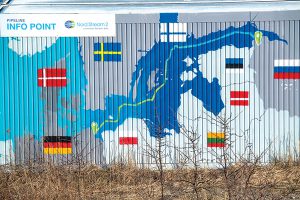Bloomberg
On a freezing winter morning, Europe woke up to a shock. Russia had cut off gas to Ukraine. Companies started reporting drops in supplies via the transit country. Calls to reduce energy dependence on Moscow resonated across the continent.
That was in January 2006. Sixteen years on, through another supply crisis and then Russia’s annexation of Crimea, the European Union is much in the same place: plotting ways to cut reliance on its single biggest gas supplier and bracing for a stoppage of flows as Russia wages war on Ukraine.
The awkward reality for Western Europe is that however much the writing was put on the wall, energy policy came from a different script. Europe’s ambition is to lead the global fight against climate change by shifting away from fossil fuels, but it’s so far failed to translate into a weaker role for gas in the economy. And that also means Russia.
Dwindling domestic gas production means that the EU is more dependent on foreign suppliers than ever. Russia’s export company Gazprom PJSC provides at least 40% of imports into the bloc. The figure was more than 60% for Germany, Europe’s largest economy, in 2020.
At the same time, the growing political leverage that Russia built with Nord Stream, an undersea pipeline linking Russia with Germany and bypassing Ukraine, rang alarm bells in former communist members of the EU. Then Berlin’s policy of economic rapprochement with the Kremlin paved the way for an expansion of the gas project — Nord Stream 2 — which was halted by Germany only after the invasion of Ukraine by Russian forces on Feb. 24.
“Despite the warning signs, appeasement of Russia has failed to prevent a war in Europe,†said Manfred Weber, German chairman of the European People’s Party, the biggest political group in the European Parliament. “Europe was too naive, too much focused on economic cooperation.â€
EU Energy Commissioner Kadri Simson said in an interview on March 3 that the situation right now isn’t comparable with the disruption 16 years ago because the EU is better prepared and has closer cooperation. She acknowledged that Russian companies “still have extraordinary market share in our natural gas market.â€
From Simson’s predecessor at the time to Austria’s economy minister, though, the political messages back in January 2006 were clear: Europe must diversify its energy sources. And the scale of the challenge was already visible several months later.
That October, Russian President Vladimir Putin arrived in Dresden for his fifth meeting with German Chancellor Angela Merkel of the year. He laid out his vision for Germany: Nord Stream would transform the country from just a consumer into Europe’s largest gas hub.
 The Gulf Time Newspaper One of the finest business newspapers in the UAE brought to you by our professional writers and editors.
The Gulf Time Newspaper One of the finest business newspapers in the UAE brought to you by our professional writers and editors.
